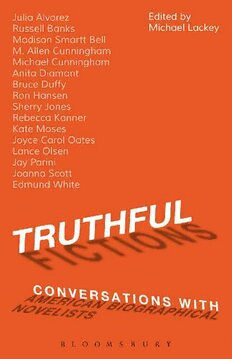Table Of ContentTruthful Fictions
9781623567415_txt_print.indd 1 17/01/2014 09:02
9781623567415_txt_print.indd 2 17/01/2014 09:02
Truthful Fictions
Conversations with American
Biographical Novelists
Edited by Michael Lackey
9781623567415_txt_print.indd 3 17/01/2014 09:02
Bloomsbury Academic
An imprint of Bloomsbury Publishing Inc
1385 Broadway 50 Bedford Square
New York London
NY 10018 WC1B 3DP
USA UK
www.bloomsbury.com
Bloomsbury is a registered trade mark of Bloomsbury Publishing Plc
First published 2014
© Michael Lackey, 2014
All rights reserved. No part of this publication may be reproduced or transmitted
in any form or by any means, electronic or mechanical, including photocopying,
recording, or any information storage or retrieval system, without prior
permission in writing from the publishers.
No responsibility for loss caused to any individual or organization acting on
or refraining from action as a result of the material in this publication can be
accepted by Bloomsbury or the author.
Library of Congress Cataloging-in-Publication Data
A catalog record for this book is available from the Library of Congress.
ISBN: HB: 978-1-6235-6741-5
PB: 978-1-6235-6825-2
ePDF: 978-1-6235-6182-6
ePub: 978-1-6235-6615-9
Typeset by Fakenham Prepress Solutions, Fakenham, Norfolk NR21 8NN
Printed and bound in the United States of America
9781623567415_txt_print.indd 4 17/01/2014 09:02
For Julie
9781623567415_txt_print.indd 5 17/01/2014 09:02
9781623567415_txt_print.indd 6 17/01/2014 09:02
Contents
Acknowledgments viii
Introduction: The Rise of the American Biographical Novel 1
Interviews:
1 Fixed Facts and Creative Freedom in the Biographical Novel
Julia Alvarez 27
2 The Truth Contract in the Biographical Novel Russell Banks 43
3 Big Revolutionary Bangs in the Biographical Novel Madison
Smartt Bell 57
4 Building the Imaginative Record with the Biographical Novel
M. Allen Cunningham 75
5 The Biographical Novel and the Complexity of Postmodern
Interiors Michael Cunningham 89
6 Imagining a Matrilineal History in the Biographical Novel
Anita Diamant 101
7 In the Fog of the Biographical Novel’s History Bruce Duffy 113
8 Sensualizing and Contextualizing Historical “Truth” in the
Biographical Novel Ron Hansen 129
9 The Art of Claiming Power in the Biographical Novel Sherry Jones 141
10 Feminist Naming in the Biographical Novel Rebecca Kanner 153
11 Re-Composing a Life in the Biographical Novel Kate Moses 161
12 Enhanced Symbolic Interiors in the Biographical Novel Joyce
Carol Oates 179
13 The Biographical Novel’s Practice of Not-Knowing Lance Olsen 193
14 Reflections on Biographical Fiction Jay Parini 205
15 The Masking Art of the Biographical Novel Joanna Scott 217
16 Gay Interiors and the Biographical Novel Edmund White 231
Contributors 247
Bibliography 253
Index 257
9781623567415_txt_print.indd 7 17/01/2014 09:02
Acknowledgments
In the summer of 2011, my wife, knowing my admiration for Walter
Benjamin, gave me a copy of Jay Parini’s biographical novel Benjamin’s
Crossing, which focuses on the last year of Benjamin’s life, when he was
fleeing the Nazis. By this point in my life, I had read only a few biographical
novels, such as Arna Bontemps’ Black Thunder, Zora Neale Hurston’s Moses,
Man of the Mountain, William Styron’s The Confessions of Nat Turner, Bruce
Duffy’s The World as I Found It, and Irvin Yalom’s When Nietzsche Wept. But
it was Benjamin’s Crossing that made me reflect on the rich power of this
aesthetic form, so I decided to contact Jay about giving a lecture on the topic
of the biographical novel at my university. Over the course of the next few
months, Jay and I had many conversations about the origin, evolution, and
nature of the biographical novel. To get more insight into it, I organized a
round-table forum with Jay, Bruce Duffy, and Lance Olsen at the University
of Minnesota’s Institute for Advanced Study. It was my conversations with
Jay, Bruce, and Lance that inspired me to do this book. Therefore, my
greatest thanks for making Truthful Fictions possible go to my wife, Julie
Eckerle, Jay, Bruce, and Lance.
I am also immensely grateful to all the authors who allowed me to
interview them. This was an incredibly demanding project, because I had
to fly to many cities in order to interview sixteen writers. But instead of
exhausting me, the interviews energized me, as all the writers were so eager
and excited to discuss their work and the development of the biographical
novel.
For financial support, it is simply impossible to imagine any institution
being more generous than the University of Minnesota. The University gave
me two Imagine awards and one grant-in-aid; the Institute for Advanced
Study funded my round-table forum; and the University of Minnesota,
Morris gave me two Faculty Research Enhancement Fund awards and one
course release. All of this support has enabled me to complete this project.
Additionally, the university generously gave me funding for my research
assistants, Rachel Balzar, Kelsey Butler, and Adrienne Haataja, who far
exceeded my very high expectations, for which I am very grateful. A special
word of thanks goes to Roger Wareham. In all my years doing research, never
have I met a person in grants development who more passionately, tirelessly,
and aggressively secures funding for faculty research. My university is lucky
to have Roger.
9781623567415_txt_print.indd 8 17/01/2014 09:02
Acknowledgments ix
I would also like to thank Sandy Kill, interlibrary loan manager at the
University of Minnesota, Morris, who makes my job much easier because
she does her job so well.
Finally, I want to thank my editor, Haaris Naqvi. From the beginning, he
has believed in this project and in me.
Michael Lackey
9781623567415_txt_print.indd 9 17/01/2014 09:02

